2009 年广东省惠州市中考英语真题及答案
一、听力理解(本大题分为 A、B、C、D 四部分,共 25 小题,每小题 1 分,共 25 分)
A.听句子(本题有 5 小题,每小题 1 分,共 5 分)
根据所听句子的内容和所提的问题,选择符合题意的图画回答问题。每小题听一遍。
1. What’s Annie’s mother doing now?
2. How did the man go to Shanghai?
3. Who does Henry often talk with?
4. Where does Mary like to swim?
5. Which festival is the speaker talking about?
B.听对话(本题有 10 小题,每小题 1 分,共 10 分)
回答每段对话后面的问题,在各题所给的三个选项中选出一个最佳答案。每段对话听
两遍。
听第一段对话,回答第 6 小题。
6. When did Peter go to the cinema?
A. Last Saturday.
B. Last Sunday.
C. Yesterday.
听第二段对话,回答第 7 小题。
�
7. Where are the two speakers now?
A. In the hospital.
B. In a shop.
C. In a bank.
听第三段对话,回答第 8 小题。
8. Why is Jack unhappy?
A. Because he can' t borrow money from Fred.
B. Because he can' t go to Fred's birthday party.
C. Because he has no money to buy a present for his friend.
听第四段对话,回答第 9 小题。
9. How long is the stone bridge?
A. Nine meters.
B. Ten meters.
C. Eleven meters.
听第五段对话,回答第 10 小题。
10. What color is John' s bike?
A. Black.
B. Blue.
C. Yellow.
听第六段对话,回答第 11—12 小题。
11. How often does the girl need to water the flowers?
A. Three times a week.
B. Twice a week.
C. Once a week.
12. Where will the boy go?
A. Canada.
B. America.
C. England.
听第七段对话,回答第 13—15 小题。
13. Where is the bookstore?
A. In the shopping center.
B. In the restaurant.
C. In the school.
14. How can the woman go to the bookstore?
A. By car.
B. By bike.
C. On foot.
15. What kind of food can the woman have at Green Land?
A. Italian food.
B. Chinese food.
C. French food.
C. 听短文(本题有 5 小题,每小题 1 分,共 5 分)
请根据所听内容,在每小题给出的三个选项中,选出一个能完成句子的最佳答案。短
文听两遍。
16. This story tells about a
.
�
A. special class
B. young teacher
C. beautiful woman
17. Tina was
years old when she started teaching.
A.22
B. 15
C. 10
18. Tina wanted to help children who can't
.
A. hear
B.see
C. play
19. Tina learned to talk with the children by using
.
A. hands
B. mouth
C. eyes
20. Tina teaches the children
.
A. on weekdays
B. on weekends
C. every day
D. 听填信息(本题有 5 小题,每小题 1 分,共 5 分)
Jim 想加入健康俱乐部,请你根据 Jim 的介绍填写下面的申请表(Application Form)。
短文听两遍。
Application Form
Name: Jim White
Date of birth: May 27, 1993.
Address: 29 Lincoln Road, (21)
the library.
Family members: Parents and two (22)
Hobbies: Football, swimming (23)
, and tennis.
Prizes: Watson Bay’s (24)
Player of football in 2008.
Date of last medical examination: (25)
16, 2008.
Telephone: 2325-3041
E-mail: Timmy@ Hotmail, com
二、单项填空(本大题有 20 小题,每小题 1 分,共 20 分)
在每小题的四个选项中,选出可以填入空白处的最佳答案。
26. There are
months in a year. October is the
month.
A. Twelve; ten
B. twelfth; tenth
C. twelve; tenth
D. twelfth; ten
27. ―We have five kinds of schoolbags. Do you like this one?
―No. Can you show me
?
A. another
B. each other
C. the other
D. others
28. The film " Kung Fu Panda" is
interesting
I would like to see it again.
�
A. such; that
B. too; to
C. as; as
D. so; that
29.
old man behind Mary is
university teacher.
A. An; an
B. A; the
C.The; a
D. The; an
30. E-mail is very popular today. People seldom write letters now,
?
A. did they
B. do they
C. didn't they
D. don't they
31. The Changjiang River is the
river in China.
A. long
B. longest
C. short
D. shortest
32. Mike didn' t get wet because his teacher
him an umbrella.
A. lent
B. discovered
C. borrowed
D. taught
33. “It's really very kind
you to help me with the housework on Sundays,”
said Grandma Huang.
A. of
B. with
C. for
D. from
34. Sam
Chinese since he came to China. He speaks good Chinese now.
A. learns
B. learned
C. has learned
D. will leam
35. We have to get up at 7 :15 tomorrow morning,
we will be late for the
7 :40 train.
A. before
B. or
C. if
D. so
36. Don’t
others. Sometimes you make mistakes too.
A. knock at
B. laugh at
C. look at
D. arrive at
37. Tom’s mother asked him
some washing after dinner.
A. to do
B. does
C. do
D. did
38. If it
tomorrow, we will stay at home. We won’t go to the museum.
A. rain
B. rains
C. will rain
D. rained
39. —Shush, be quiet! The baby
in the next room.
—OK. Sorry.
A. sleep
B. slept
C. sleeps
D. is sleeping
40. Lily's mother looked for her for half an hour, but could not find
.
A. what Lily was
B. what was Lily
C. where Lily was
D. where was Lily
�
41.
terrible weather we had last Sunday!
A. What
B. What a
C. Such
D. How
42. ―
?
―I have a headache.
A. How do you do
B. What do you do
C. What's wrong with you
D. How do you like it
43. —Mr Wang, must I come again on Sunday morning to clean the windows?
―No, you
. I have asked others to do it.
A. Don’t have to
B. mustn’t
C. can’t
D. shouldn’t
44. ―It’s really hot today. What drinks do we have in the fridge?
―We have some
.
A. noodle
B. cheese
C. sausages
D. lemonade
45. The new library building
last week.
A. was completed
B. is completed
C. completed
D. has completed
三、完形填空(本大题有 10 小题,每小题 1 分,共 10 分)
通读下面短文,掌握其大意,然后在各小题所给的四个选项中,选出一个最佳答案。
Sunday was going to be the birthday for me and my other two classmates. As we
were bom in the 46 month, we decided to have a big party to 47 it.
On that evening, we invited all of our classmates. We prepared a lot of food
and drinks. After singing the birthday song, we 48 the delicious cake together.
We sang more songs and played games. Then someone told funny stories, and 49 laughed.
Three hours flew by quickly. Because we had to 50 before 11:00, we ended our party
at 10: 00. Before we left, our classmates gave 51 of us a birthday card with their
best wishes. 52 we took some pictures together. What a great time we had! At that
moment, I felt love, happiness and friendship.
Before the party, only my 53 could remember my birthday, and I had never had
such a big party and so many friends’ wishes. 54 I wanted to say to my classmates,
"Thank you, and I will 55 forget this evening, especially each of you!"
46. A. different
B. best
C. same
D. some
�
47. A. cost
B. celebrate
C. laugh
D. love
48. A. sent
B. remembered
C. prepared
D. shared
49. A. everyone
B. someone
C. anyone
D. no one
50. A. go to the party
B. go to bed
C. go to school
D. go to work
51. A. both
B. some
C. each
D. most
52. A. Finally
B. Firstly
C. However
D. Anyway
53. A. teachers
B. classmates
C. parents
D. friends
54. A. Since
B. So
C. Though
D. After
55. A. already
B. yet
C. ever
D. never
四、阅读理解(本大题有 15 小题,每小题 2 分,共 30 分)
阅读下列短文,并做每篇短文后的题目。从每小题所给的四个选项中选出能回答所提
问题或完成所给句子的最佳答案.
A
WELCOME TO TONGJIANZOO
Do you want to see the animals from nearly every part of the world in just
one place in one day? Come to Tongjiang Zoo. The zoo has more than 2,000 animals
of 400 kinds. Big elephants from Yunnan, tigers from the south and the northeast
of China, and the African lions, giraffes, and zebras, are all waiting for you.
Lovely pandas and clever monkeys are going to make you laugh. A lot of other animals
which you have never seen are waiting to meet you. It’s home to a collection of
animals.
Tongjiang Zoo was built in 1985 and is about 20,000 square metere. There is
basic information of each kind of animals about their living habits ana birth
places. You can certainly learn a lot. You are welcome to take photos with some
animals.
Ticket Price
Grown-ups:¥30.00
Children:¥15.00
Children under Six: Free
Opening Time From Monday to Friday: 9:00~16:30
Saturday and Sunday: 8:00—17:30
�
Keep the zoo clean. Do not feed or go near the dangerous animals.
56. The animals in Tongjiang Zoo are from
.
A. Yunnan
B. South China
C. Northeast China
D. different places
57. Mr and Mrs Green are going to the zoo with their five-year-old son. They have
to pay
for the tickets.
A. fifteen yuan
B. thirty yuan
C. forty-five yuan
D. sixty yuan
58. The zoo closes at —
on weekends.
A. 5:30 p. m.
B. 4 :30 p.m.
C. 9:00 a. m.
D. 8:00 a. m.
59. Visitors
in the zoo.
A. mustn’t take photos with all animals
B. mustn’t go close to the dangerous animals
C. can give food to the animals
D. can throw your things around
60. Which of the following is NOT true?
A. The zoo has a history of more than twenty years.
B. You can see many rare(珍贵的)animals in the zoo.
C. You can see 2,000 kinds of different animals in the zoo.
D. You can get some basic knowledge of the animals in the zoo.
B
The first robots were invented in the 1920s. Robots have appeared in many
American films. In some films, they are stronger, faster and cleverer than people.
In real life, robots are mainly used in factories. They do some dangerous and
difficult jobs for humans.
Robots also help disabled people, for example, blind people. Today many blind
people have a guide (向导)dog to help them. In the future, guide dogs might be robot
dogs.
�
One kind of robot guide dog has wheels. It moves in front of the owner. It is
very clever. It knows the speed of its owner’s walk. The owner wears a special
belt (带子).This belt sends instructions to the owner from the dog, such as " Stop
here" "Turn left" or "Turn right".
In the United States, another kind of robot helps disabled people to take care
of themselves in their daily life. The robot hears the sound of its owner’s voice.
It follows instructions such as "Turn the page" or "Make a cup of coffee".
Robots are also used in American hospitals. They can do simple jobs. At one
hospital, for example, a robot takes meals from the kitchen to patients, rooms.
It never gets lost because this robot has a map of the hospital in its computer
memory.
Though robots can help people in many different ways, they will never take the
place of humans.
61. From the passage, we know robots cannot be
.
A. dangerous animals
B. factory workers
C. guide dogs
D. hospital helpers
62. A robot guide dog ―
.
A. goes in front of blind people
B. walks side by side with blind people
C. has a map in its head
D. helps patients with their meals
63. The underlined word "disabled" means
.
A.不能的
B.有害的
C.失灵的
D.残疾的
64. Some disabled people need robots' help to
.
A. lake care of themselves
B. talk to other people
C. become scientists
D. do dangerous jobs
65. In the passage, the writer wants to tell us that
.
A. robots are stronger and cleverer than humans
B. disabled people cannot look after themselves without the robots
C. robots will take the place of humans some day in the future
�

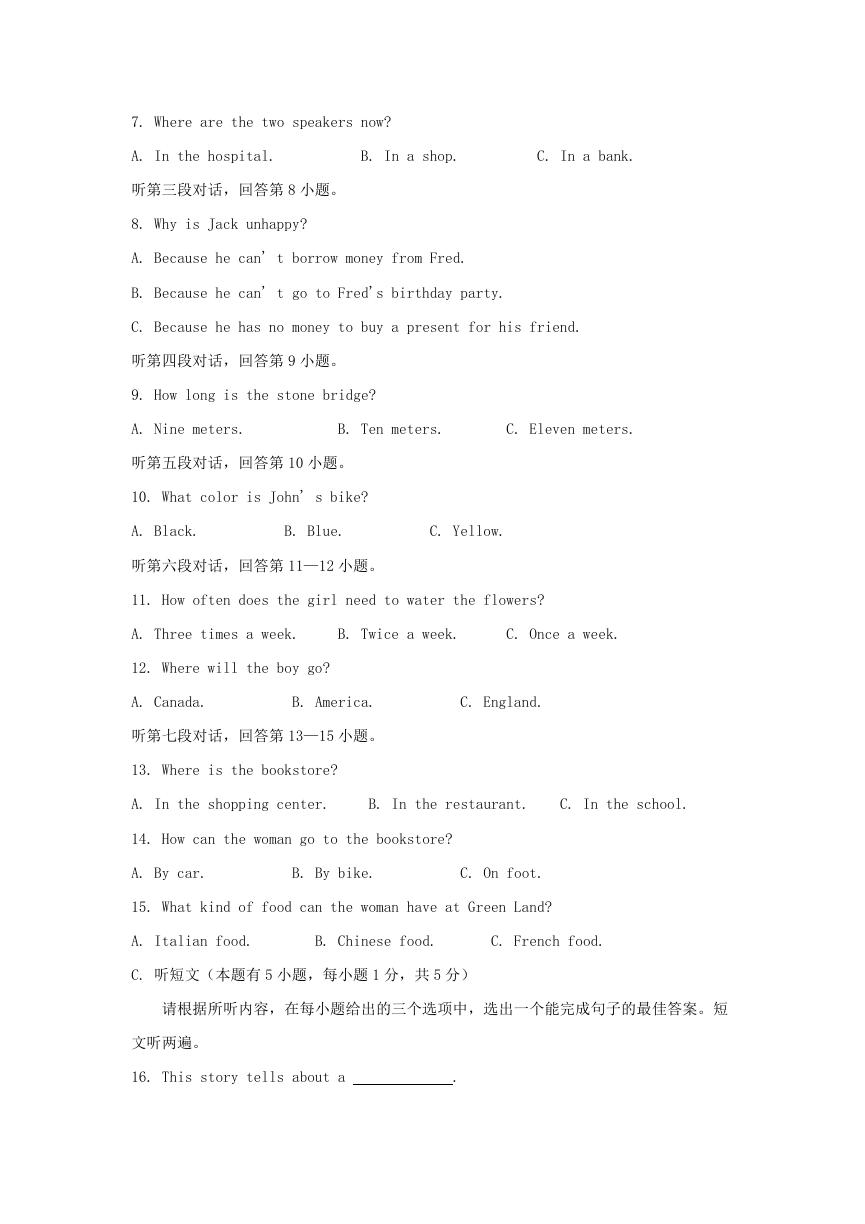
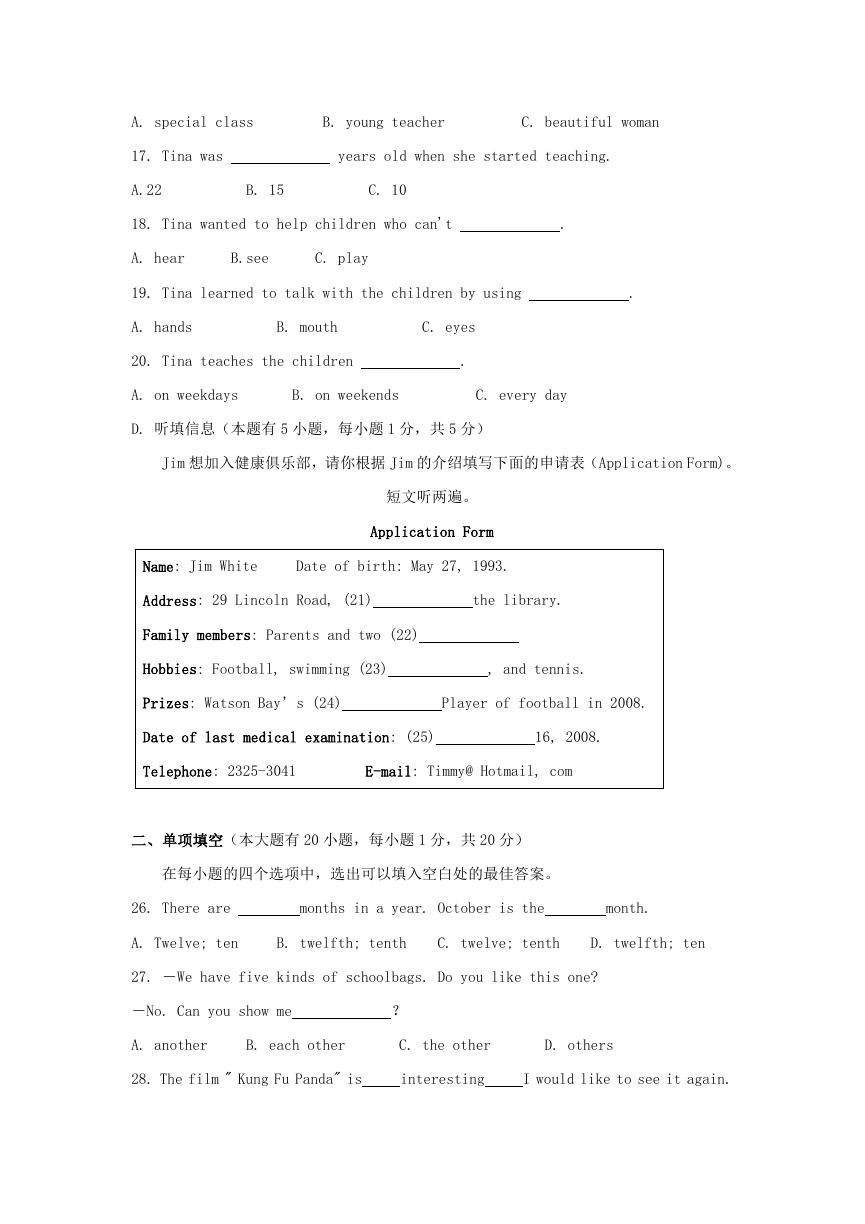
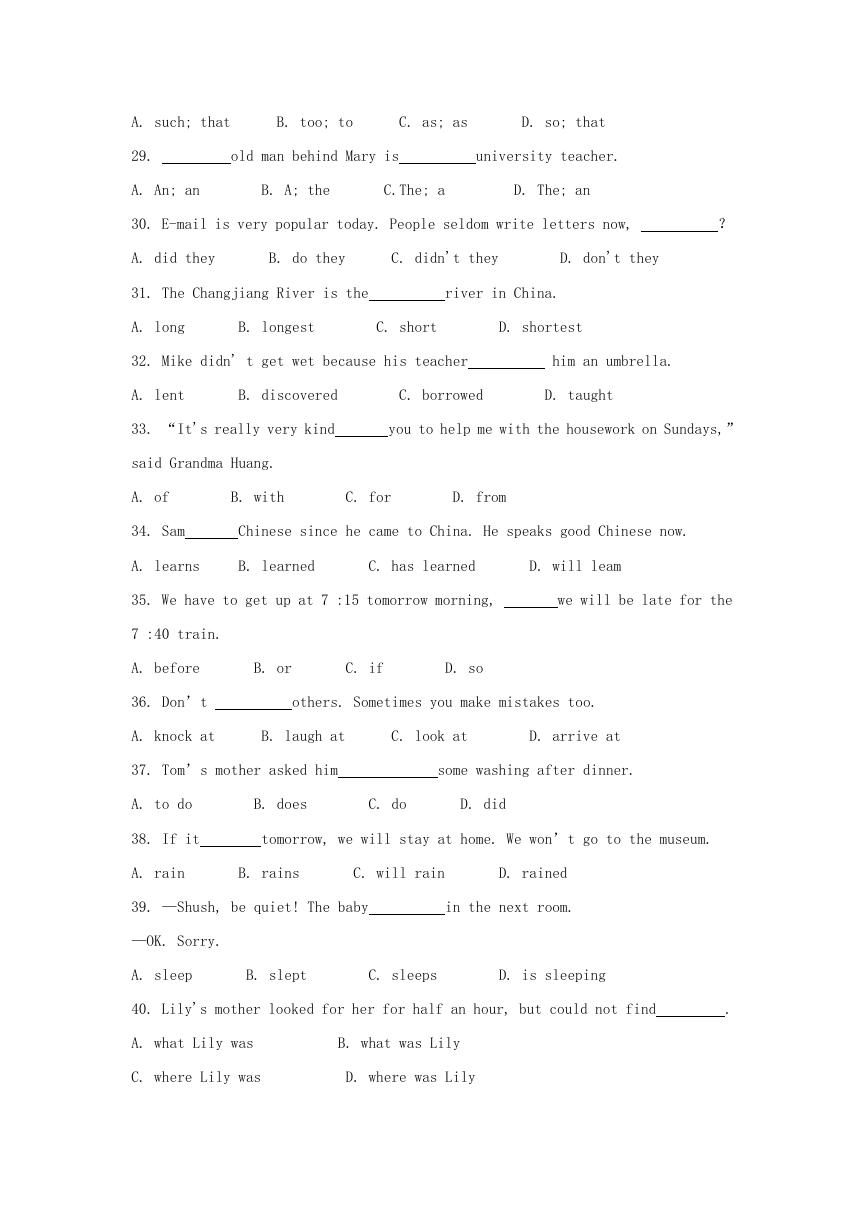
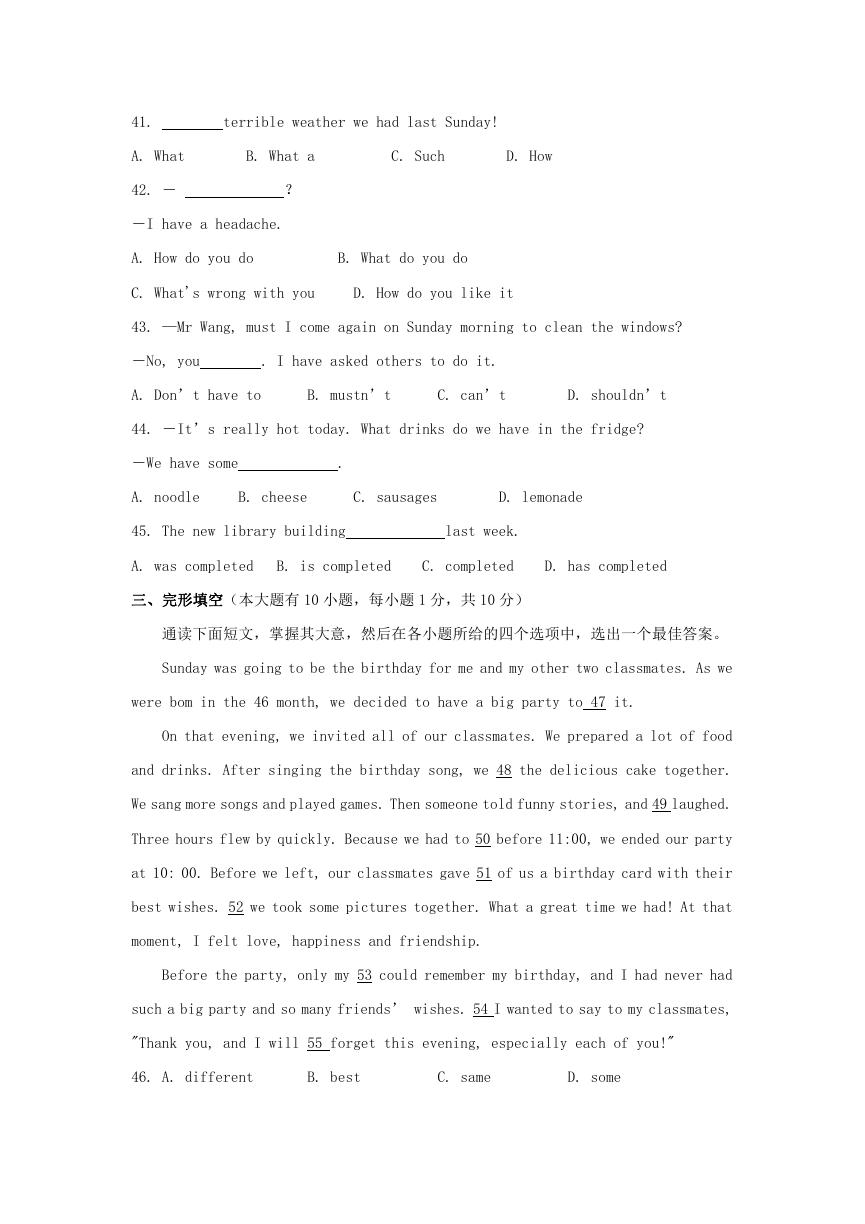
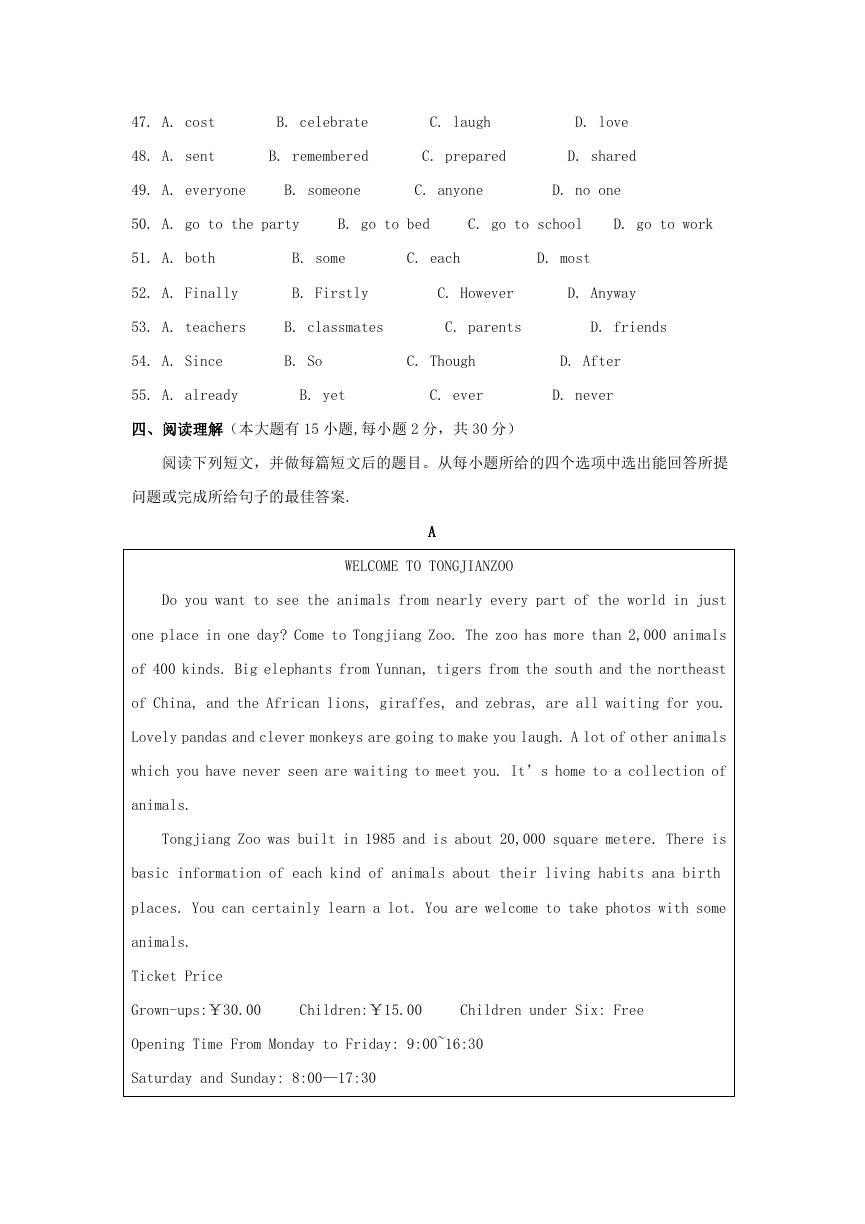
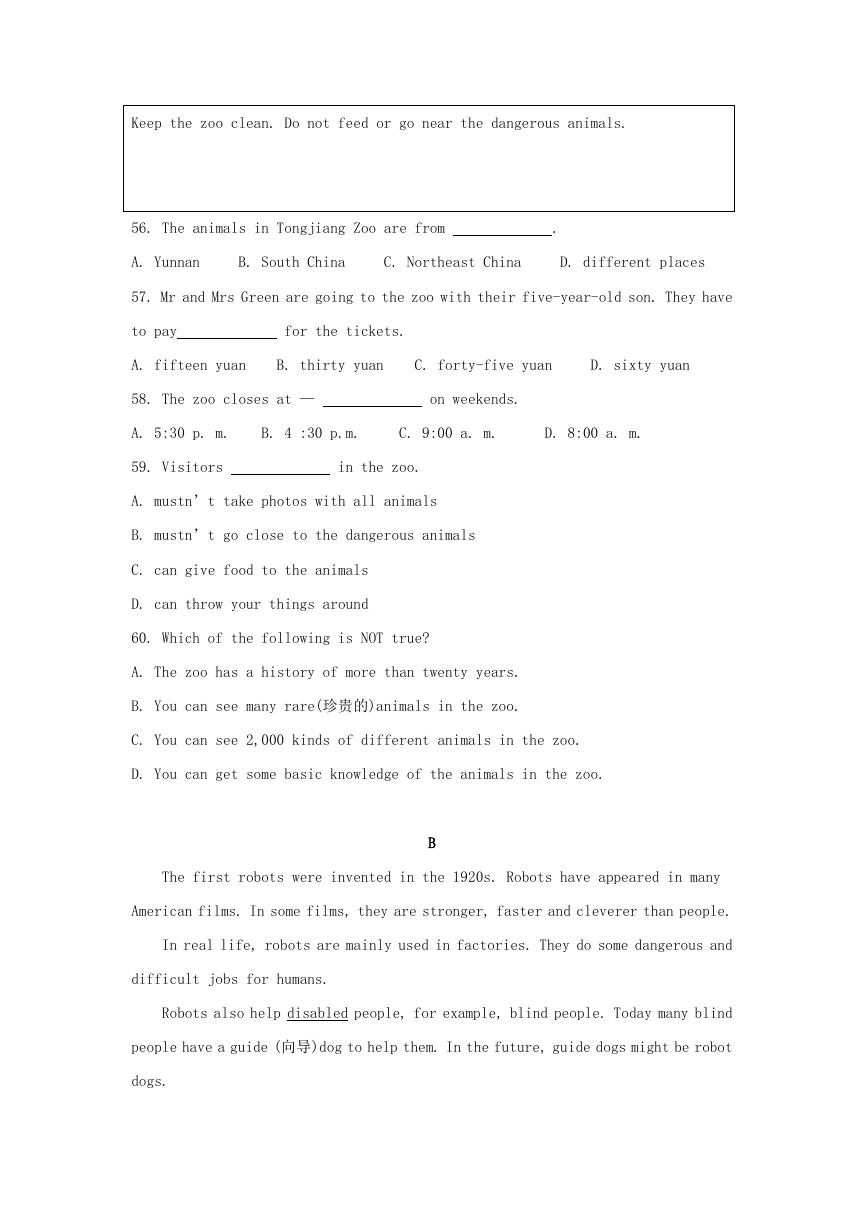









 2023年江西萍乡中考道德与法治真题及答案.doc
2023年江西萍乡中考道德与法治真题及答案.doc 2012年重庆南川中考生物真题及答案.doc
2012年重庆南川中考生物真题及答案.doc 2013年江西师范大学地理学综合及文艺理论基础考研真题.doc
2013年江西师范大学地理学综合及文艺理论基础考研真题.doc 2020年四川甘孜小升初语文真题及答案I卷.doc
2020年四川甘孜小升初语文真题及答案I卷.doc 2020年注册岩土工程师专业基础考试真题及答案.doc
2020年注册岩土工程师专业基础考试真题及答案.doc 2023-2024学年福建省厦门市九年级上学期数学月考试题及答案.doc
2023-2024学年福建省厦门市九年级上学期数学月考试题及答案.doc 2021-2022学年辽宁省沈阳市大东区九年级上学期语文期末试题及答案.doc
2021-2022学年辽宁省沈阳市大东区九年级上学期语文期末试题及答案.doc 2022-2023学年北京东城区初三第一学期物理期末试卷及答案.doc
2022-2023学年北京东城区初三第一学期物理期末试卷及答案.doc 2018上半年江西教师资格初中地理学科知识与教学能力真题及答案.doc
2018上半年江西教师资格初中地理学科知识与教学能力真题及答案.doc 2012年河北国家公务员申论考试真题及答案-省级.doc
2012年河北国家公务员申论考试真题及答案-省级.doc 2020-2021学年江苏省扬州市江都区邵樊片九年级上学期数学第一次质量检测试题及答案.doc
2020-2021学年江苏省扬州市江都区邵樊片九年级上学期数学第一次质量检测试题及答案.doc 2022下半年黑龙江教师资格证中学综合素质真题及答案.doc
2022下半年黑龙江教师资格证中学综合素质真题及答案.doc